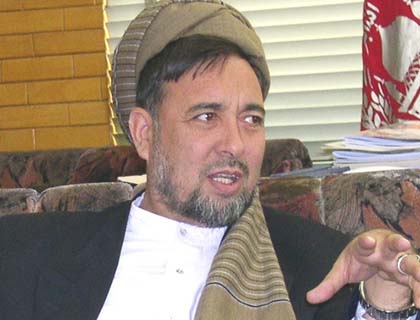KABUL - Skepticism is growing inside Afghanistan's ethnic communities that a peace deal can be struck with the Taliban, under whose rule they were brutalized and persecuted, with many fearing a return to civil war, a prominent Hazara leader said.
Haji Mohammad Mohaqiq said he was deeply worried about NATO plans to pull out combat troops by end-2014, and a French government proposal to leave a year earlier, by 2013.
"It is silly to say al Qaeda and Taliban can come together with Afghans, or (with) our allies who have come to this country," Mohaqiq told Reuters late on Sunday in an interview at his heavily-guarded Kabul mansion.
"I don't believe in a miracle occurring, that the Taliban will change their way of thought, accept the Afghan constitution, believe in democracy and the vote of the people."
Mohaqiq, head of the opposition Hezb-e-Wahdat (Unity Party) and a member of parliament, fought the Soviets in the 1980s and was part of the anti-Taliban Northern Alliance, which splintered amid political deal-making under Afghan President Hamid Karzai.
But alliance members are now coalescing again, bringing ethnic Tajiks, Uzbeks and Hazaras into a common front to oppose the blueprint for Taliban peace negotiations masterminded by the United States, and now being re-cast again by an Afghan government nervous of being sidelined by Washington.
Other ethnic group members such as Tajik leader and Afghan National Front chief Ahmad Zia Masood, whose brother once led opposition commanders fighting the Taliban, said this month that he also did not believe a deal could be reached with the Taliban, calling for more involvement in peace negotiations.
Mohaqiq said he believed thousands of insurgents had been trained across the porous mountain border in Pakistan during a decade of war with NATO and Afghan forces.
"They are waiting for NATO forces to withdraw from Afghanistan to attack. We can anticipate what is going to happen," Mohaqiq said.
"Now tens of thousands of armed insurgents have already been trained in North Waziristan."
Mohaqiq said President Karzai and his western backers were moving too hastily to accommodate the Taliban, wearied by a war now dragging into its 11th year, and warned NATO must not repeat the mistake of withdrawing from the country too early.
"When his presidency is over he can go to any place in the world to survive, but the Afghan people will be left behind," he said. "What we want is for the international community to act wisely."
Mohaqiq said the Afghan army was incapable of protecting minority Afghans if it proved the Taliban were holding the promise of peace talks to stall and regroup, as some Afghanistan analysts have warned.
"The army is ethnically structured in a way so it cannot fight the Taliban. It's possible they would just surrender when the Taliban attacked," he said.
Mohaqiq said ethnic opposition parties, which also included former Northern Alliance General and Uzbek leader Abdul Rashid Dostum, wanted consideration of the country's future to include a revamp of the political system away from a centralized presidency towards effective multiparty government.
"But we are not very optimistic that the Taliban will join the peace process and other political factions in Afghanistan, support the government and work in a system together," he said. (Reuters)

